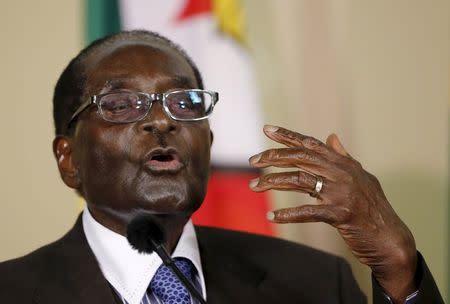Zimbabwe's Mugabe defends mine ownership plan, lampoons "brutal" West

By Tendai Dube PRETORIA (Reuters) - Zimbabwe's President Robert Mugabe on Wednesday defended his government's drive to take majority control of foreign-owned mining companies, saying investors must pay for exploiting Africa's mineral wealth. In his first state visit to neighbouring South Africa in two decades, 91-year-old Mugabe was scathing of mining firms that criticised a law obliging foreign-owned firms to sell at least 51 percent to black Zimbabweans. "You're leaving holes in my country and you want to say the capital is more valuable?" Mugabe told reporters after trade talks with South African President Jacob Zuma. "The gold that I have, God given gold, is much more beneficial to my country," he added, drawing applause from Zimbabwean and South African government ministers. Impala Platinum, Anglo American Platinum and London-listed Aquarius Platinum are among foreign firms operating in Zimbabwe, which has significant reserves of platinum, diamonds and gold. Mugabe, Zimbabwe's only leader since independence from Britain in 1980 and one of Africa's most divisive figures, was also defiant on the seizure of white owned commercial farms for redistribution to blacks. Land is an emotive issue also in South Africa, where most of it remains in white hands since apartheid ended two decades ago despite the ruling party's efforts at redistribution. Western countries have withheld financial aid to Harare in protest over Mugabe's policies and charges he has rigged elections to stay in power, worsening an economic crisis that has driven millions of Zimbabweans to South Africa for jobs. During an hour-long, unscripted speech, Mugabe attacked the "reckless and brutal approach of the West" towards Africa and the Middle East, lampooning former British Prime Minister Tony Blair and describing the United Nations as a "circus". Mugabe also drew raucous laughter from the South African delegation with jokes about protests by Cape Town students for the removal a statue of Cecil Rhodes, a British imperialist who is buried in Zimbabwe. "We are looking after the corpse, you have the statue," Mugabe said. "I don't know what you think we should do? Dig him up? Perhaps his spirit might rise again." Rhodes, regarded as one of the main proponents of white colonial domination, used his colossal diamond wealth to pursue his dream of expanding Britain's empire, annexing Mashonaland - present-day Zimbabwe - and naming it Rhodesia after himself. (Writing by Joe Brock and Stella Mapenzauswa; Editing by James Macharia and Robin Pomeroy)

